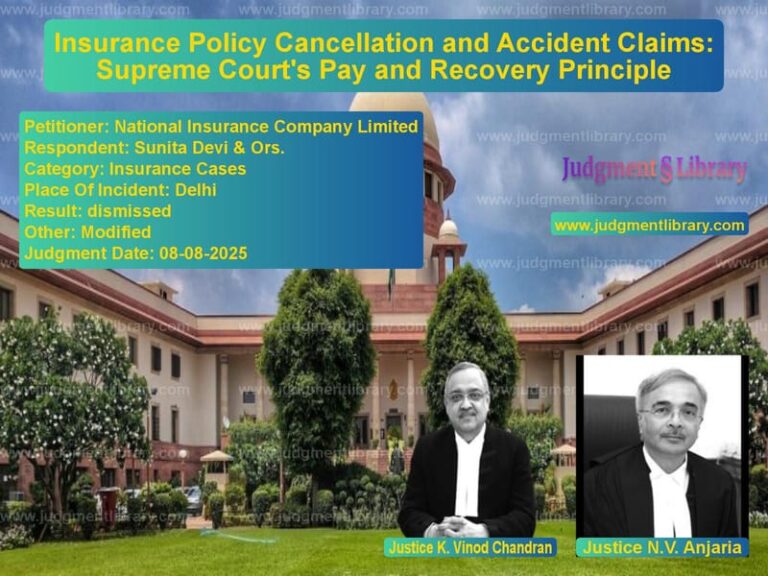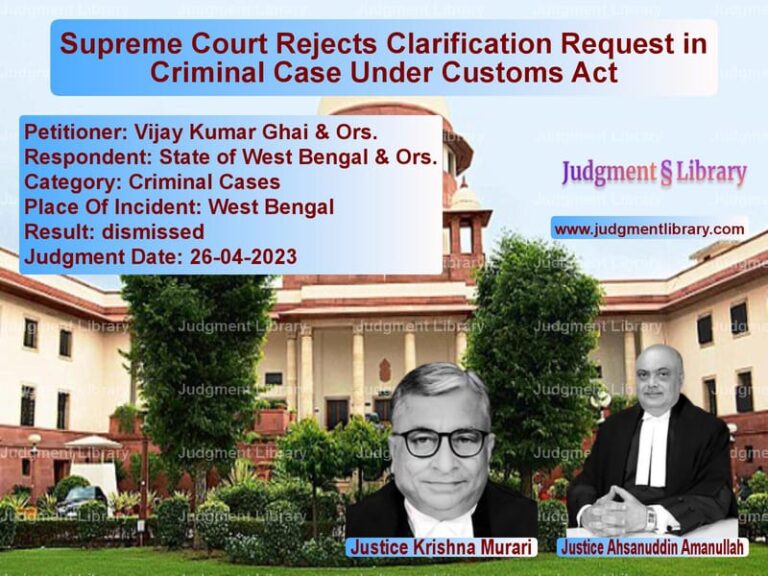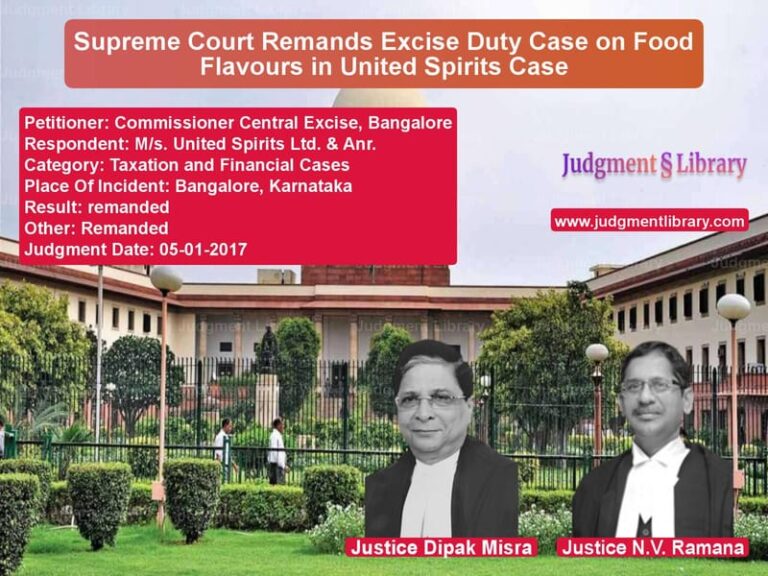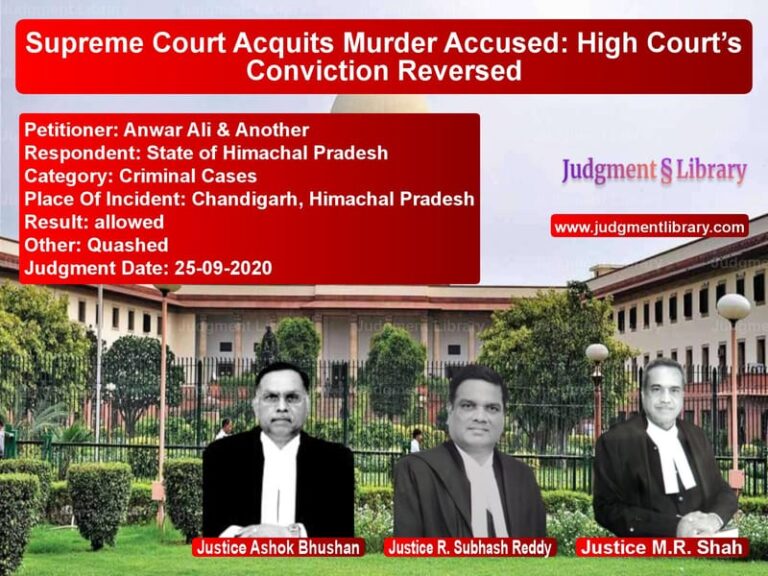Income Tax Deduction and Legislative Amendments: Supreme Court Verdict on Section 35AC and Charitable Institutions
The Supreme Court of India recently ruled on a crucial case concerning the withdrawal of tax deduction benefits under Section 35AC of the Income Tax Act, 1961. The case involved Prashanti Medical Services & Research Foundation, which challenged the retrospective effect of a legislative amendment that ceased tax deductions for donations to certain charitable projects. This ruling has significant implications for taxpayers, charitable institutions, and legislative policy.
Background of the Case
Prashanti Medical Services & Research Foundation, a registered charitable trust, established a heart hospital in Ahmedabad. On September 27, 2014, the appellant applied for approval under Section 35AC of the Income Tax Act, which allowed donors to claim deductions for contributions made to specified social welfare projects.
The approval was granted by the National Committee for Promotion of Social and Economic Welfare through a notification dated December 7, 2015, listing 28 projects, including the appellant’s hospital. The approved deduction was for three financial years: 2015-16, 2016-17, and 2017-18.
Legislative Amendment and Dispute
The Finance Act, 2016, introduced sub-section (7) to Section 35AC, stating that no deduction shall be allowed for any assessment year commencing on or after April 1, 2018. This amendment effectively discontinued the deduction from the 2018-19 assessment year.
The appellant challenged this amendment, arguing that it violated their legitimate expectations and should not apply to projects already approved for the specified period.
Arguments by the Petitioner
Prashanti Medical Services & Research Foundation, through its counsel, contended:
- The legislative amendment unfairly applied retrospectively, preventing deductions for the final year (2017-18) despite prior approval.
- The government had granted approval for three financial years, and donors made contributions expecting the tax benefit.
- Retrospective withdrawal violated the principle of promissory estoppel.
- Similar institutions had already benefited from deductions in previous years; denying them for the final year created inconsistency.
Arguments by the Respondents
The Union of India and the Revenue Department defended the amendment, arguing:
- The amendment was prospective, applicable only from April 1, 2017.
- All charitable institutions were treated equally; the amendment did not target the appellant specifically.
- The government had the sovereign right to modify tax policies as deemed necessary.
- Donors had already availed deductions for contributions made in 2015-16 and 2016-17; therefore, no legal or financial prejudice was caused.
Supreme Court’s Judgment
Justice Abhay Manohar Sapre and Justice Indu Malhotra delivered the judgment, affirming the High Court’s decision and dismissing the appeal. The Court held:
“The insertion of sub-section (7) to Section 35AC is prospective in nature and applies uniformly to all charitable institutions from the assessment year 2018-19 onwards.”
The Court rejected the argument of promissory estoppel, stating:
“A plea of promissory estoppel is not available against legislative power, and no vested right accrues to an assessee in matters of tax concessions.”
Regarding the impact on donations, the Court noted:
“The appellant has already received substantial donations for two financial years, and there is no legal basis to claim an extension of benefits beyond the period prescribed by law.”
Key Takeaways
- Legislative Sovereignty: The judgment reaffirms that taxation laws can be amended prospectively without violating the rights of taxpayers or institutions.
- Limited Scope of Promissory Estoppel: In tax matters, entities cannot claim indefinite benefits based on past approvals.
- Uniform Application of Laws: The Court emphasized that all approved institutions were treated equally under the amendment.
- Charitable Donations and Tax Policy: Institutions relying on tax exemptions must be aware that policies can change, affecting long-term financial planning.
Conclusion
The Supreme Court’s ruling in this case establishes a clear precedent on the application of tax amendments and the limits of promissory estoppel in financial legislation. The judgment underscores the government’s authority to regulate tax benefits while ensuring consistency and fairness in policy application.
Petitioner Name: Prashanti Medical Services & Research Foundation.Respondent Name: Union of India & Ors..Judgment By: Justice Abhay Manohar Sapre, Justice Indu Malhotra.Place Of Incident: Ahmedabad, Gujarat.Judgment Date: 25-07-2019.
Don’t miss out on the full details! Download the complete judgment in PDF format below and gain valuable insights instantly!
Download Judgment: Prashanti Medical Se vs Union of India & Ors Supreme Court of India Judgment Dated 25-07-2019.pdf
Direct Downlaod Judgment: Direct downlaod this Judgment
See all petitions in Income Tax Disputes
See all petitions in Tax Refund Disputes
See all petitions in Banking Regulations
See all petitions in Corporate Compliance
See all petitions in Public Interest Litigation
See all petitions in Judgment by Abhay Manohar Sapre
See all petitions in Judgment by Indu Malhotra
See all petitions in dismissed
See all petitions in supreme court of India judgments July 2019
See all petitions in 2019 judgments
See all posts in Taxation and Financial Cases Category
See all allowed petitions in Taxation and Financial Cases Category
See all Dismissed petitions in Taxation and Financial Cases Category
See all partially allowed petitions in Taxation and Financial Cases Category







